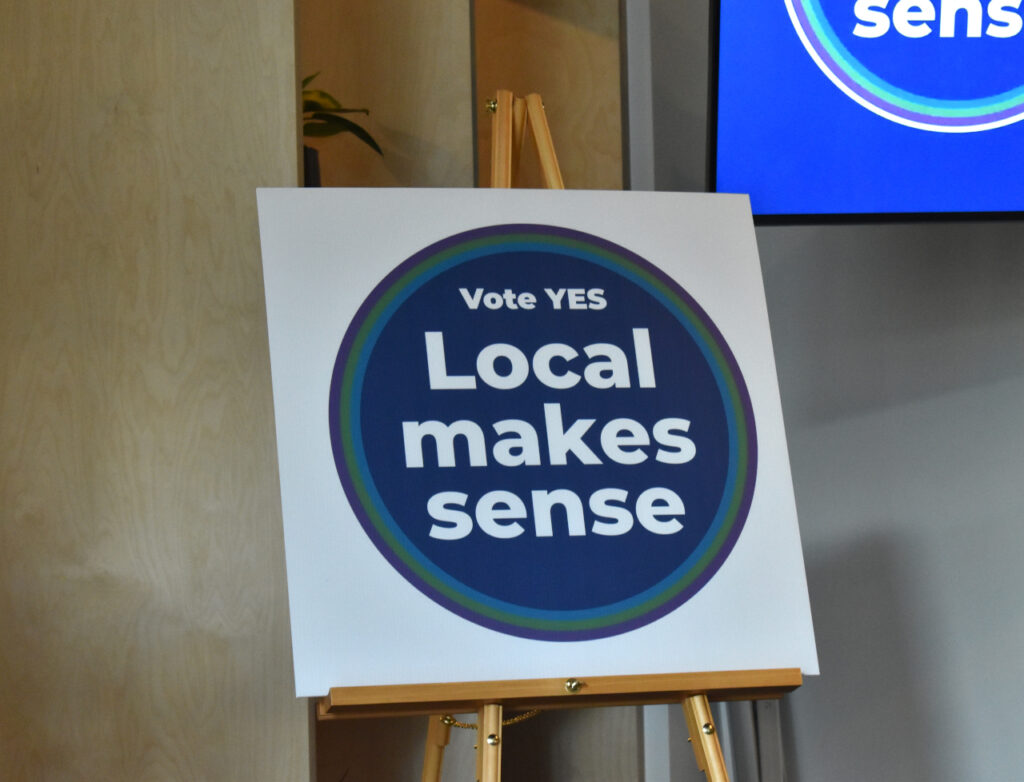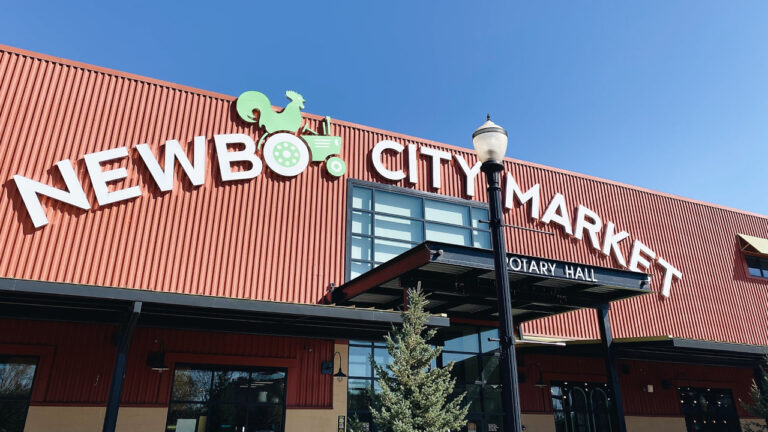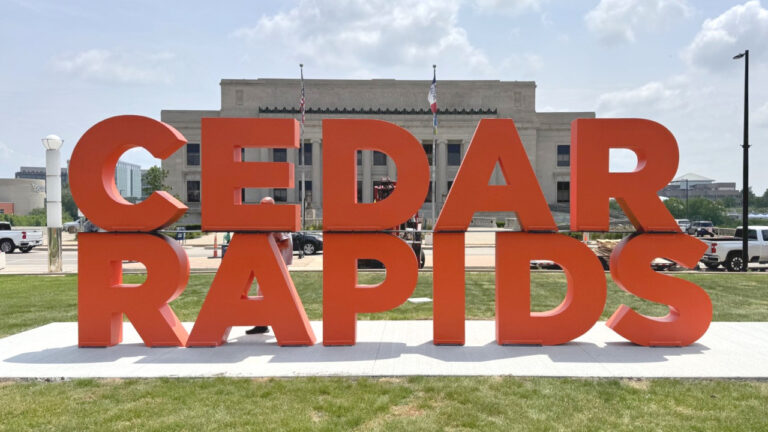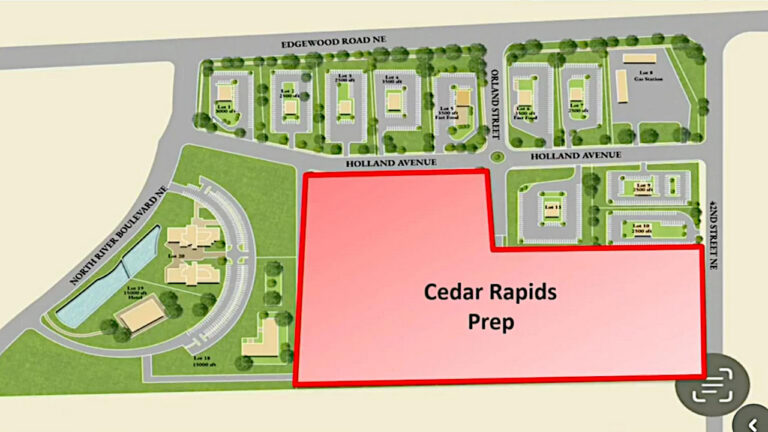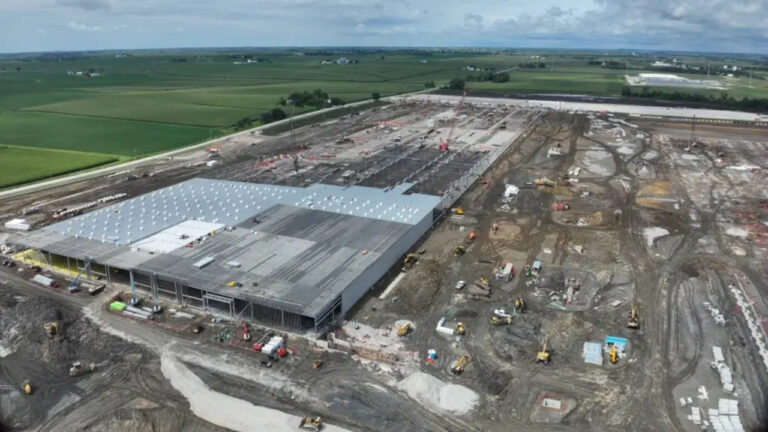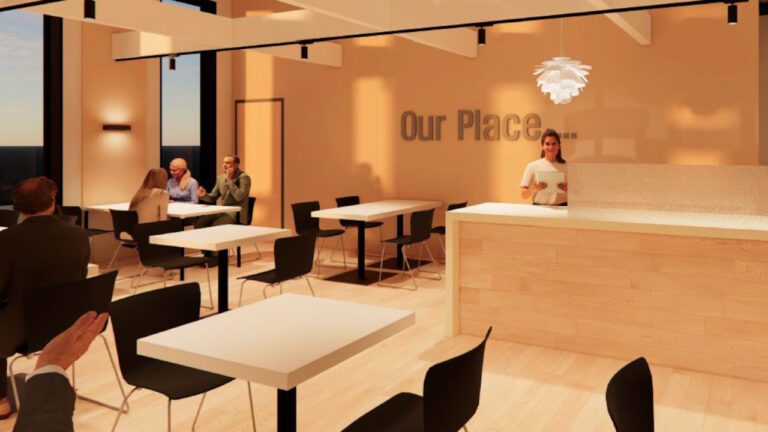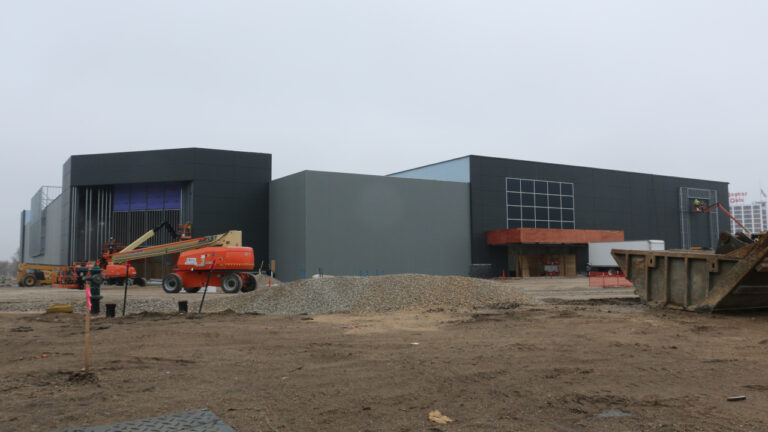The cities of Coralville, North Liberty and Iowa City teamed up on Tuesday as part of a campaign effort advocating for a 1% Local Option Sales Tax (LOST). The tax will be on the Nov. 4 city and school election ballot for all three cities.
City officials and stakeholders with the campaign, Local Makes Sense, held a press conference Sept. 2 at Greater Iowa City Inc.’s headquarters, 136 S. Dubuque St.

“Last year, Johnson County saw 5.1 million visitors to our region and 30 million trips to individual stores and restaurants,” said campaign chair Nancy Bird, president and CEO of Greater IC. “In 2023, visitors spent more than $458 million in Johnson County alone. If Coralville, Iowa City and North Liberty all pass local option sales tax, they will collectively receive over $22 million a year.”
State law stipulates that half of the local option sales tax proceeds be allocated toward property tax relief, while remaining revenues can be appropriated for capital projects, programs and initiatives.
At the press conference, campaign spokespeople representing each city pitched projects or initiatives that would be funded through the tax, should residents choose to vote for it.
A new rec center for Coralville
If Coralville residents vote for the tax on election day, the city will use the revenue to fund a new recreation center, parks, trails and affordable housing.
The current recreation center, built in 1972, no longer serves the needs of the community, said Coralville resident and campaign spokesperson Stacey Houseman.
“Revenue from a local option sales tax would allow Coralville to build a new, much needed state-of-the-art center, rather than continuing to invest tax dollars to maintain the old building. The recreation center is the heart of Coralville and has something for everyone,” she said.

The recreation center – which sees 150,000 people pass though annually – has been a focal point for the city’s last three goal setting sessions. In 2024, the city partnered with the Iowa City Community School District (ICCSD) on a master plan for the Parks and Rec department, weighing the options of renovating the existing rec center with the construction of a new facility. Currently, swim teams in the ICCSD compete for practice space with other teams and members of the public at the existing facility.
“We have eight different school teams using the pool area,” said Kelly Hayworth, Coralville city administrator. “So you have both boys and girls for all four and we have two middle schools and two high schools, so that’s a lot of kids.”
The new $54 to $56 million recreation center and indoor pool facility is slated to break ground by the late summer or fall of 2026, and will be constructed east of the existing center at 1506 Eighth St. The facility will have expanded gym, fitness and community meeting spaces, along with a natatorium containing a competition swimming pool, a recreation lap and teaching pool, and a leisure pool. The existing rec center will be demolished for parking, and the ICCSD has pledged $14 million toward the competition natatorium.
If voters reject the 1% sales tax increase, the Coralville property tax levy rate would be raised by $0.7964 per $1,000 to cover the new recreation center, the city’s website states.
“Coralville is continuing to grow,” said Ms. Houseman, adding that it’s crucial to have a rec center that can support that growth. “The amount of programming that they do is incredible. And to be able to have a newer facility that will continue to support and invest and grow more of those services for people is very exciting.”
Safety first for North Liberty
The city of North Liberty is one of Iowa’s fastest-growing communities. Between 2010 and 2016, the city grew 38%.
It’s crucial the city has public safety infrastructure that can support that growth trajectory, and North Liberty plans to improve its fire station with the 1% local option sales tax on the ballot this November.

“We would like to make sure that (the fire station) fits the modern standards, which would allow it to have aerial fire trucks or larger rescue vehicles. Right now we don’t have those, so it’s a challenge for the department to respond to fires and buildings that are taller than three stories,” said North Liberty resident and campaign co-lead Ashley Bermel.
The current station, which lacks basic safety equipment and was not constructed with 24/7 occupancy in mind, poses a risk to the city’s firefighters, she said.
“We want to make sure that we’re keeping up with the trends,” Ms. Bermel said. Not just from a population growth perspective, but also keeping the city’s first responders safe as well, she added.
The city’s lone fire station at 25 W. Cherry St. is composed of three additions dating back to 1974. Between the office building and attached apparatus bay, the station spans 12,500 square feet.
Trying to reuse the fire station’s existing apparatus bays is challenging from a structural standpoint and would require significant investment, a July 8, 2025 city council agenda noted.
Aside from the fire station, the sales tax would also fund upgrades to the city’s community center, park, trails and affordable housing.
“We want to be able to have folks in our community (have) access to affordable housing, and we know that when we have those investments (in) the community, it allows the community to thrive,” said North Liberty resident and campaign co-captain Tony Branch. “So I think that the priority areas that have been outlined by our city council that will go on the ballot continue to facilitate the growth for North Liberty.”
Iowa City focuses on affordable housing
Tom Rocklin, Iowa City resident and co-captain of the Iowa City campaign, said the city’s local sales option tax would focus on three key areas.
First, the creation of an ongoing fund to support affordable housing in the community. “We’ll spend 25% of the revenue on that goal,” he said.
Ten percent of the tax would fund street, sidewalk, park, trail and public facility upgrades, easing property tax reliance and supporting growth.
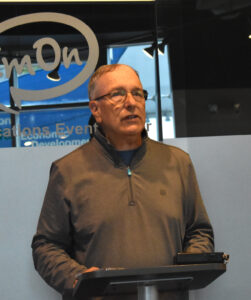
The remaining 15% would sustain and expand collaboration with community partners, Mr. Rocklin said.
“Iowa City is the home to a rich ecosystem of nonprofits that make our community stronger, especially supporting our most vulnerable members of the community,” he told the assembled audience at Tuesday’s press conference. “And this revenue will help support that community.”
The city has actively worked on a number of affordable housing initiatives over the years. In June 2024, the city was awarded a $3.75 million PRO Housing Grant from the U.S. Department of Housing and Urban Development. In September 2023 it made amendments to its zoning code to expand housing supply, and in June 2022 it updated its Affordable Housing Action Plan.
“This notion of a continuous, predictable stream for affordable housing, for community partnerships (and) different infrastructure helps us think creatively and proactively about how to address needs,” said Barbara McFadden, Iowa City resident and campaign co-captain, adding that the investments “lets us be thoughtful and smart in ways we can have solutions for the community.”
She emphasized the importance of the initiative, given the federal funding that’s being pulled from municipalities nationwide. “We’re also constrained in how we approach property tax. There’s just not a lot of options for cities to pursue new revenues. And so I think this is a creative way that we can do this. By the way, 93% of the other municipalities and I would already do this, so we’re ready to catch up,” she added.
“I think our council members recognize that housing is probably the root cause of many challenges (for) people, because you have to pay your rent. You can skip your medicine this week, but you can’t skip your rent payment, and so if your housing is consuming too much of your budget, you’re giving up other things,” Mr. Rocklin added.
“One thing that I really admire about how Iowa City came to develop their language was they brought in community partners who specialize in affordable housing, and those community partners really helped tailor the language to be very intentional and not ambiguous,” said Iowa City resident and campaign co-captain Anthony Haughton. “I think having community partners who are working in that sphere every day help develop that language, paramount to getting the right approach.”
Not everyone is in favor of the local option sales tax, however. At the Iowa City City Council meeting Aug. 5, council member Mazahir Salih expressed concern that the tax would hurt the city’s most vulnerable population, but added “that’s why I’m glad we work together to come up with this affordable housing, and everything good that will come with it.”
Affordable housing priority for all three cities
All three cities created their priority areas using guidance from their respective strategic plans and community feedback, and one thing they all had in common was the need for affordable housing.
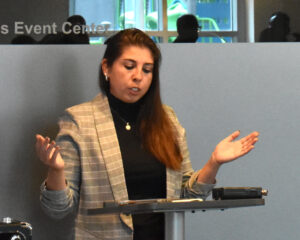
“Currently, one-third of our households are spending more than 30% of their household income on housing related expenses, leaving them limited resources for other essential needs,” said Johnson County Affordable Housing Coalition executive director Jessica Andino. “Safe, stable and affordable homes benefit everyone in our community – workers, families, seniors and local businesses alike.”
Having a local option sales tax would provide a new dedicated funding stream that allows cities to address their communities’ housing needs responsibility and proactively, she added.
‘Worthwhile investment’
“Our organization is really rooted in public private partnerships, and we know that when our cities succeed, it creates an environment where our businesses can succeed,” said Mackenzie DeRoo, senior director of advocacy with Greater Iowa City, Inc. “We’ve heard from our city partners about increasing unpredictability, and we know from a business side that having diverse revenue sources is a good idea.”
Observing other Iowa cities with a local option sales tax, the possibility seemed like a worthwhile investment, and Greater IC began gauging interest from area city councils and residents.
“One message that we really wanted to articulate was the need for affordable housing. We see it as a workforce issue,” Ms. DeRoo said. “It comes up a lot of the time when we’re talking with employers, and so we were really encouraged that city councils as well as our nonprofit advocates for housing were able to come together around that issue while still giving cities the latitude they need to fund their most urgent priorities.”
If voters in Coralville, North Liberty and Iowa City approve the measure on Election Day, a local option sales tax would take effect July 1, 2026. The tax is already in place in Swisher, Solon, Lone Tree, Hills, Tiffin and University Heights.


